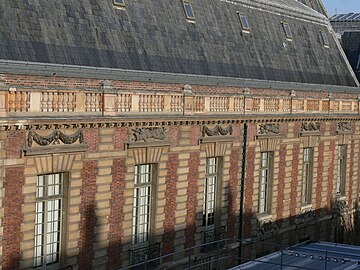Hôtel Duret De Chevry, Rue Des Petits-Champs
The Hôtel Tubeuf is a typical hôtel particulier with a central corps de logis set between an entrance courtyard and a garden. The entrance courtyard is on the south side and was formerly enclosed on all sides. The street entrance seen today was constructed in the 18th century. The street facade as it existed in the 17th century can be seen in an engraving by Jean Marot.
-
Street front of the Hôtel Tubeuf in the 17th century, engraved by Jean Marot
-
Street front in 2016
The Hôtel Tubeuf is one of the last and most splendid examples in Paris of brick-and-stone architecture (popular in France in the early 17th century). Brick-and-stone had already gone out of style at the time this hôtel was built, but was used at the request of Duret. The building reflects the architect's fondness for elaborate rustication, stone chaines and quoins, and uncommonly shaped pediments decorated in low-relief.
A garden gallery, designed by François Mansart ca. 1644–45, was later added to the Hôtel Tubeuf. Of Mansart's designs only the exterior, and not the interior, of the garden gallery survives in somewhat altered form, with crossed quivers and garlands typical of Mansart visible above the upper windows.
The Louisiana Purchase Treaty was signed at the Hôtel Tubeuf on 30 April 1803.
The Hôtel Tubeuf now hosts the departments of prints and photographs (Département des estampes et de la photographie) and of maps and plans (Département des cartes et plans) of the French National Library. The project to renovate and expand the space for Maps and Plans was conducted from 1946 to 1954 by the Library's cartography chief Myriem Foncin and the chief architect Michel Roux-Spitz.
-
Garden gallery of the Hôtel Tubeuf
-
View of the garden side c. 1890
-
Plaque on the Hôtel Tubeuf commemorating the signing of the Louisiana Purchase Treaty
See also
- Hôtel de Nevers (rue de Richelieu)
- Hôtel de Nevers (left bank)
- Hôtel Duret de Chevry, rue de Parc-Royal
- Place Dauphine
Notes
- ^ Ayers 2004, p. 57; Braham & Smith 1973, vol. 1, p. 224; Babelon 1996.
- ^ Ayers 2004, pp. 57–58.
- ^ Base Mérimée: PA00086009, Ministère français de la Culture. (in French)
- ^ Face du Palais Mazarin à Paris at Gallica; Deutsch 2015, pp. 459 (date of publication), 465 (cat. item [76]); According to Deutsch 2015, p. 132, most of the engravings in the Grand Marot were created between 1649 and the early 1670s; also reproduced by Braham & Smith 1973, vol. 1, p. 224; vol. 2, plate 316.
- ^ Blunt & Beresford 1999, p. 109.
- ^ Braham and Smith 1973, pp. 70–73, 223–226, plates 318, 319
- ^ Chappet et al. 2005, p. 307.
- ^ La Roncière, Monique de (1978). "Myriem Foncin (1893-1976)". Annales de Géographie. 87th Year, no. 481 (May-June 1978), pp. 320–325. JSTOR 23450698.
Bibliography
- Ayers, Andrew (2004). The Architecture of Paris. Stuttgart; London: Edition Axel Menges. ISBN 9783930698967.
- Babelon, Jean-Pierre (1996). "Thiriot, Jean", vol. 30, p. 734–735, in The Dictionary of Art (34 vols.), edited by Jane Turner. New York: Grove. ISBN 9781884446009.
- Blunt, Anthony; Beresford, Richard (1999). Art and Architecture in France, 1500–1700, 5th edition. New Haven, Connecticut: Yale University Press. ISBN 9780300077483.
- Braham, Allan; Smith, Peter (1973). François Mansart, 2 volumes. London: A. Zwemmer. ISBN 9780302022511.
- Chappet, Alain; Martin, Roger; Pigeard, Alain (2005). Le guide de Napoleon: 4000 lieux de mémoire pour revivre l'épopée. Paris: Tallandier. ISBN 9782847342468.
- Deutsch, Kristina (2015). Jean Marot : Un graveur d'architecture à l'époque de Louis XIV. Berlin: De Gruyter. ISBN 9783110375954.
![Street front of the Hôtel Tubeuf in the 17th century, engraved by Jean Marot[4]](http://upload.wikimedia.org/wikipedia/commons/thumb/7/76/L%27Architecture_fran%C3%A7aise_%28Marot%29_BnF_RES-V-371_076r-f159_Palais_Mazarin%2C_Face_%28adjusted%29.jpg/382px-L%27Architecture_fran%C3%A7aise_%28Marot%29_BnF_RES-V-371_076r-f159_Palais_Mazarin%2C_Face_%28adjusted%29.jpg)



